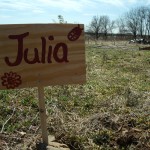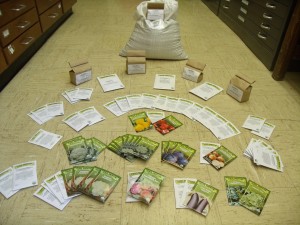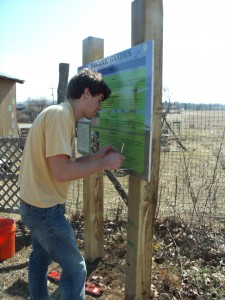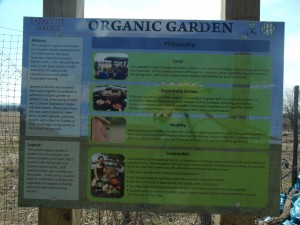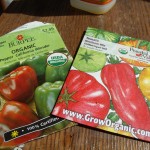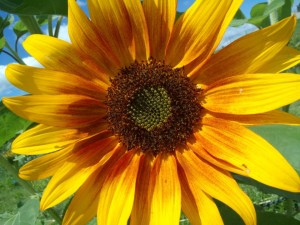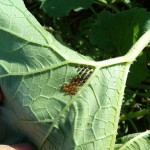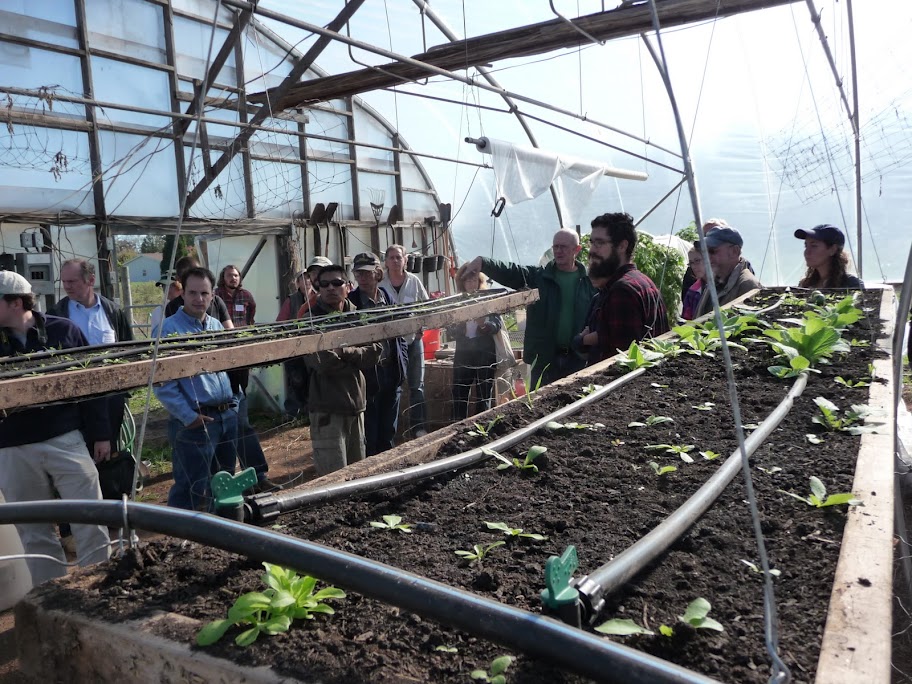Today, I’m back to work rejuvenated and excited about the new season even more than before! Here is a quick recap about the 2012 conference:
Intro: The Pennsylvania Association of Sustainable Agriculture 2012 Farming for the Future conference was a great experience. Farmers, community organizers, business
owners, educators, and so many people that are interested in sustainable agriculture and food came together to learn and interact. There were 2 days of pre-conference tracks and
2 full days of conference workshops and speakers.
Here is a quick breakdown on the events I attended:
1) Pre-Conference Track on Tractors:
This was a great experience to learn a little introduction to tractors. This class was taught in the Penn State Ag Arena by three Penn State employees. First, we learned about
pre-operation checks, safety, and equipment maintenance. Next, we discussed how to buy equipment: used or new, and what to look for. We then learned a bit about operations and how to hitch and unhitch attachments and got a chance to try driving. This was my first
experience driving a tractor and I drove the New Holland TC45 with loader… great fun!
2.) Next on Thurs night, I attended some social events including the Young & Beginning
Farmer Mixer, Cheese tasting, and live music. This was a great chance to network, catch up with old friends, and meet lots of people doing sustainable agriculture across PA and the north east.
3.) On Wednesday, the real conference began. I took a morning yoga class and then was off to workshop #1. I went to Oilseeds for Food and Fuel taught by Doug Shaufler from Penn State Farm operations. I am interested in feasibility of a potential research operation in making oil for food. We learned about the processing of oils including seed cleaning,
prep, pressing and extraction, filtration, and processing.
4.) Next was a keynote speaker, but I missed the chance to get a seat! It was standing room only, so I took this time to talk with many vendors, visit the auction, and do some
seed swapping. The next presentation I went to was by a local Lehigh Valley farmer, Tom Murtha. He talked about his successful heirloom tomato growing technique called grafting that he uses in his very successful high tunnels.
5.) Next, there were breakout discussion sessions. I went to one called “Building a Regional Staple Food System” because, again, I’m interested in potential research projects for the College. What I learned from this discussion is that this is a very important
aspect of local farming today that is missing in our region: staple foods play a major part of our diets, but are not available locally. We have many fruit and veggie producers in the area, but there are no local or sustainable grain, bean, or oil nearby that I know of. This is
something that is very possible and very necessary to have a local food system, but requires some larger equipment such as a combine and processing equipment.
6.) The next presentation I went to was by Homer Walden from Sunnyside Farm. I’m familiar with this farm and farmer because I went to a PASA Innovative Farm workshop held at his farm last fall (see picture from previous post). This talk was on Drip
Irrigation and Rain Barrels, we have always had large-scale rain barrels at the community garden and student farm, but drip irrigation is something new we will be doing this year at the student farm.
7.) The next morning, I again attended yoga and then headed to the first workshop of the day, called Designing a Sustainable Fruit Production System on your diversified farm by Lou Lego at Elderberry Pond Farm. This had some great information and tips on growing a mix of fruit and veggies with an emphasis on what
varieties have worked best (including disease resistant varieties that both taste great and grow successfully for the organic grower). Also, he covered what specific varieties of apples are good for what uses.
8.) Next was the PASA awards and Keynote speaker, Shannon Hayes. She was an unbelievable woman who is famous for her books on radical homesteading and two farm fresh cook books: remind us all that simplicity helps us realize what’s important in life.
9.) Next, I attended a workshop on Efficient Human-Powered Vegetable Production by Kenneth Mulder, the Farm Manager at Green Mountain College in VT. This gave me a whole new appreciation for what we do at the Lafayette student farm! We
are also human powered!! With the exception of yearly tillage and an occasional weedwacking, we use hand tools such as the wheel hoe, hand implements, and reel mower to control our weeds. They do 1.5 acres (we do 1) of completely human-powered: no tilling
except when breaking new ground. This is very inspiring! This talk also gave me tons of good tips on efficiency and useful tools for our operation.
10.) The final presentation I went to (tear, so sad!) is on diagnosing pest and disease problems in vegetables by two folks from Penn State. This was an unfortunately depressing note to end on, haha! It focused on all the possible problems that can be experienced, and we organic growers felt like we had seen it all!! I learned a lot of great
tips for dealing with problems and found the #1 most important thing to be SANITATION. Anything that was at your garden (stakes, organic matter, string, fence, etc) last year has the potential for harboring disease. Clean it thoroughly or use new.
Conclusion:
As you can imagine, I’m a little overwhelmed by all of this wonderful information, but really pumped to put it to action. It was so hard to choose which workshops to attend
because I wanted to be at several each time slot. If you are interested in any of the topics listed and want more information, please leave a comment here with your contact info and I will get you more info. For this post, I wanted to write just a
sentence or two about each topic, but some topics I have several pages of information I can share!
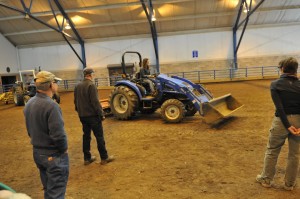
Jenn driving a tractor at PASA 2012, photo from PASA website
